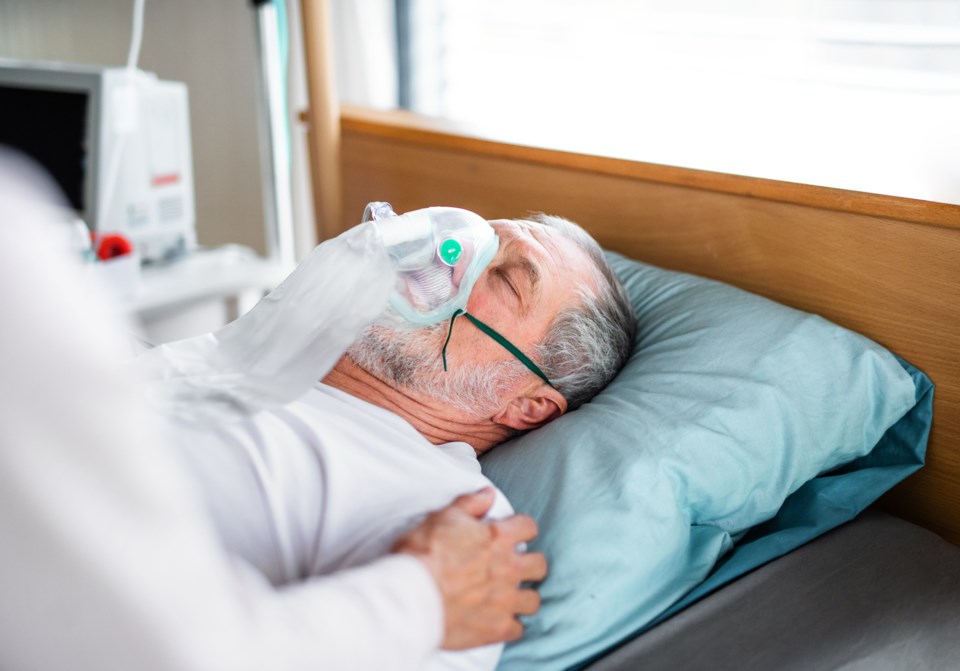New COVID-19 infections are increasing at an alarming rate, and have more than doubled compared to earlier this week.
B.C. health officials detected 753 COVID-19 cases in the past day, which is the highest daily total since October 28, when lab technicians discovered 758 infections. This single-day number is also around where the province's seven-day rolling average for cases was at the peak of the fourth wave of infections in September.
Part of the reason for the spike in cases is that health officials conducted 17,195 tests, which is far more than they have done in any day in at least many weeks. The positive-test rate, at 4.37%, is higher than it has been in many weeks, if not months, but only marginally higher than the 4.25% rate two days ago.
The new infections include:
• 232 in Fraser Health;
• 240 in Vancouver Coastal Health;
• 99 in Interior Health;
• 45 in Northern Health;
• 137 in Island Health.
The government did not say how many of the new cases are the Omicron variant, which has been spreading quickly worldwide, and has prompted governments to put in place new travel restrictions. Canada yesterday, for example, reinstated an advisory against all non-essential international travel.
The B.C. government did provide an update on the total number of Omicron cases so far detected in B.C.: 135. That is more than triple the Omicron case count four days ago.
All B.C. health regions have detected Omicron cases. The known Omicron infections include:
• 38 in Fraser Health;
• 20 in Vancouver Coastal Health;
• five in Interior Health;
• one in Northern Health;
• 71 in Island Health.
The new infections raise the number of people actively battling COVID-19 in B.C. to 3,878 – the highest count since November 12.
Active infections include:
• 1,091 in Fraser Health;
• 999 in Vancouver Coastal Health;
• 644 in Interior Health;
• 238 in Northern Health;
• 905 in Island Health; and
• one people who normally live outside B.C.
Good news is that the number of people sick enough with COVID-19 to need hospital care declined by nine overnight, to 184 – the fewest since August 30. Of those, 70 are in intensive care units (ICUs), which is the lowest number since August 20.
Other good news is that there are no active outbreaks at health-care facilities for the first time in months, thanks to the outbreak at Ponderosa Lodge, in Kamloops, being declared over.
Three people died of complications related to COVID-19 in the past day, raising B.C.'s pandemic death toll to 2,396. Those who died were in the Fraser Health, Vancouver Coastal Health and Island Health regions.
Of the 224,998 people known to be infected in B.C. with COVID-19 since the province's first case was detected in January, 2020, 218,616, or 97.2%, are considered by the government to have recovered.
The B.C. government usually considers COVID-19 patients to have recovered if they have gone 10 days following first feeling symptoms, as they are therefore deemed to no longer be infectious. Some patients, however, continue to have health problems for months after their recoveries.
Unvaccinated people continue to be the ones most spreading the disease.
Between December 8 and December 14, people not fully vaccinated accounted for 46.3% of new cases, and between December 1 and December 14, those individuals accounted for 70.2% of hospitalizations.
This is despite the vast majority of British Columbians being fully vaccinated.
This is the one-year anniversary of the announcement that the first vaccine doses had been jabbed into arms in B.C. On December 16, 2020, the B.C. government announced that 409 doses of the Pfizer-BioNTech vaccine were provided to health-care workers.
Back then, one year ago, B.C. was enduring its deadliest week of the pandemic, with 133 deaths. In the past week, B.C. has had 18 COVID-19-related deaths.
B.C. government data today highlights the rapid uptake of the vaccination program. There have been 4,327,774 B.C. residents who have had at least one dose of vaccine, while 4,110,723, or just shy of 95% of those, are fully vaccinated with two doses.
B.C.'s booster dose campaign is ramping up, providing third doses of the vaccine to immunocompromised people, those older than 70 years who have gone six months after their second dose, as well as to healthcare workers and those who received two AstraZeneca doses of vaccine, and have gone six months since their second dose. Others older than 18 years are expected to be allowed, in stages, to get booster doses in 2022.
A record 29,953 people received their booster dose in the past 24 hours, for a total of 660,784 people.
Regular vaccinations are also being done, with 5,494 British Columbians getting their first jab in the past day, while 2,803 others received second doses of vaccine.
The B.C. government estimates that 86.8% of eligible British Columbians, older than five years, have had at least one vaccine shot, while 82.5% of that eligible group is fully vaccinated with two jabs.
The B.C. government last year estimated in that the province's total population is 5,147,712, so Glacier Media's calculation is that more than 84% of B.C.'s total population has had at least one dose of vaccine, and almost 79.9% of the province's total population has had two doses. •



